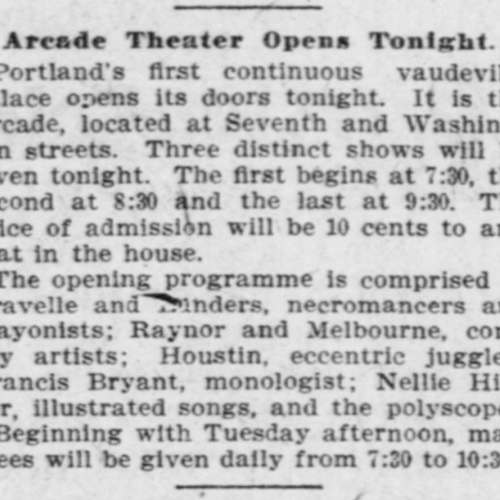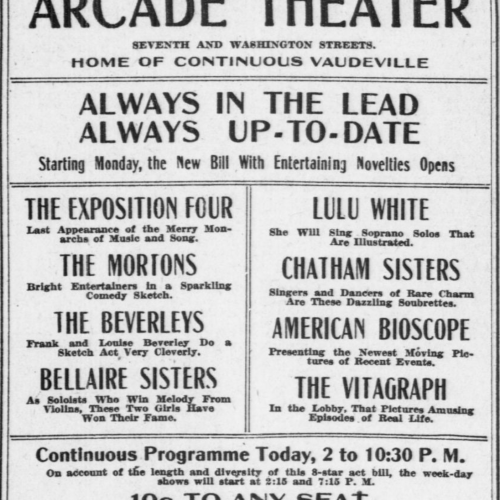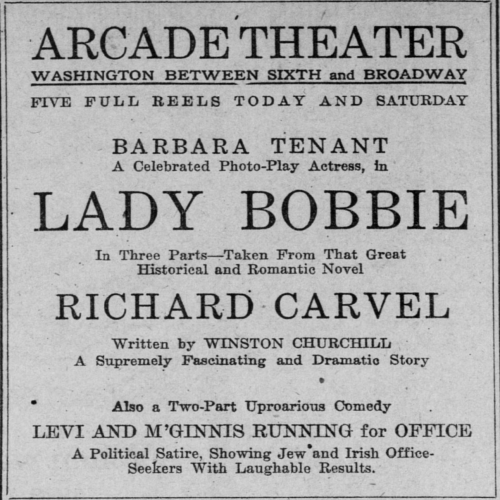The Beginnings
When the Arcade theater first opened its doors on October 12th in 1903, raised at the hands and wallet of S. Morton Cohn and managed by Edward Shields, at (SW) 330 Washington St and in between Seventh and Sixth St. Later, after street renovations occurred, the theater was still in the same geographic position, but the theater was then at 627 Washington St, contained by the streets Broadway and Sixth. Shields, a man known for his success in the industry of amusement from his own namesake theaters and others, was highly regarded among the Portland exhibitors. Cohn found his theater in a busy part of the town that would likely offer many chances to gain audience members for any one of his three to five shows in a single day. The foundation of this specific theater was established under the concept that it would be like no other theater that locals had seen. As technology advanced and people's desires were focused, entrepreneurs like Cohn attempted to hone the craft of exhibition and display a higher level of vaudeville that was able to integrate many acts, while maintaining routine crowds and quality content.
A Confrontational Start
Before the contracts for the Arcade began in 1903, there were connections established between proprietor, S. Morton Cohn, and manager, Edward Shields. Cohn likely was aware of the track record of Shields and his other successful theaters, thus prompting thoughts of security at the Arcade. However, within the business aspect of early amusements like play-houses and moving picture houses, it is not far-fetched to claim that personalities often did not get along all of the time. Within the first month of business at the Arcade, Cohn had already fired Shields under reasons of incompetency and that his work "was unsatisfactory from the first day." Though potentially difficult to see the value of such an article, one must look at such sources through the lens in which they were formed; look to establish a perspective for the person who may have written the source. Shields in Portland in the early 1900's was a fairly influential man who set many of the trends when it comes to exhibition in the city. For Cohn, somewhat of a newcomer to the industry, to claim and outright denounce his practices and methods as not functional for a business was likely a huge slam to the business of exhibition, and in a way gave a chance for smaller theaters to prosper over large circuits. It is mentioned at the end of the clipping from Nov. 1903 that Cohn doesn't wish to appoint a manager or "receiver" because what a theater should rely on drawing a crowd is the content and performers, not the name associated with the show -- potentially another way that Cohn gained viewership is through the intricate programming of diverse shows.
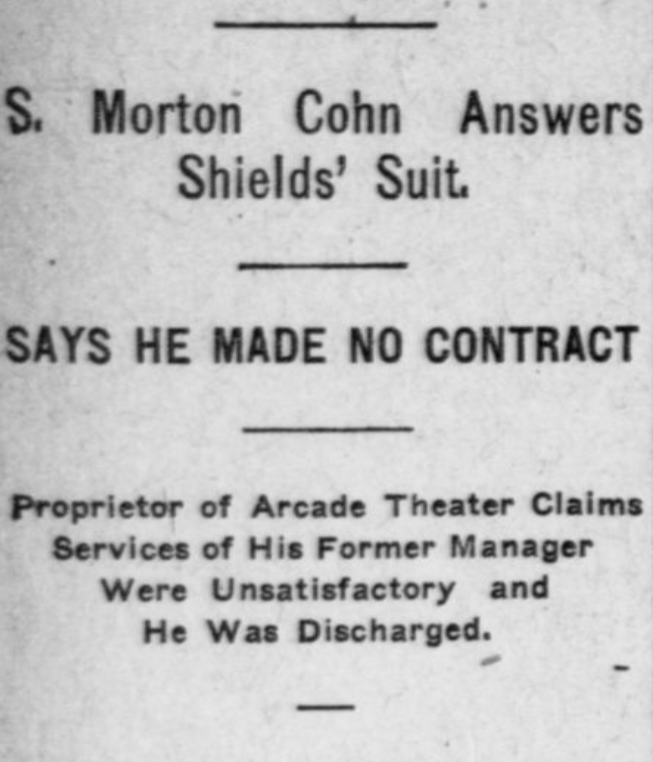
The First and Foremost
A seemingly key factor in the promotion of the Arcade theater surrounds the fact that the Arcade has consistently claimed that it was Portland's first so-called "continuous vaudeville" house. The combination of these two words implying two things: one will seemingly always be able to see shows if they were to walk up to the ticket booth and that there were to be enough variety within a week that clients would desire to return. In a way, it seemed as though the Arcade was making attempts to capitalize on the varying degree of classes they had attending shows. One promotional article on the opening of the house notes that each and every seat in the house is only a dime, though, for that dime at another point in the week, one could see a completely different show at the same theater.
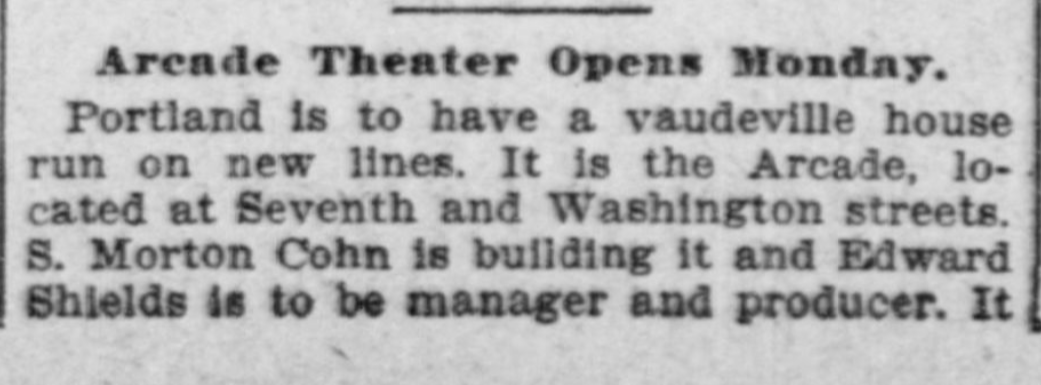
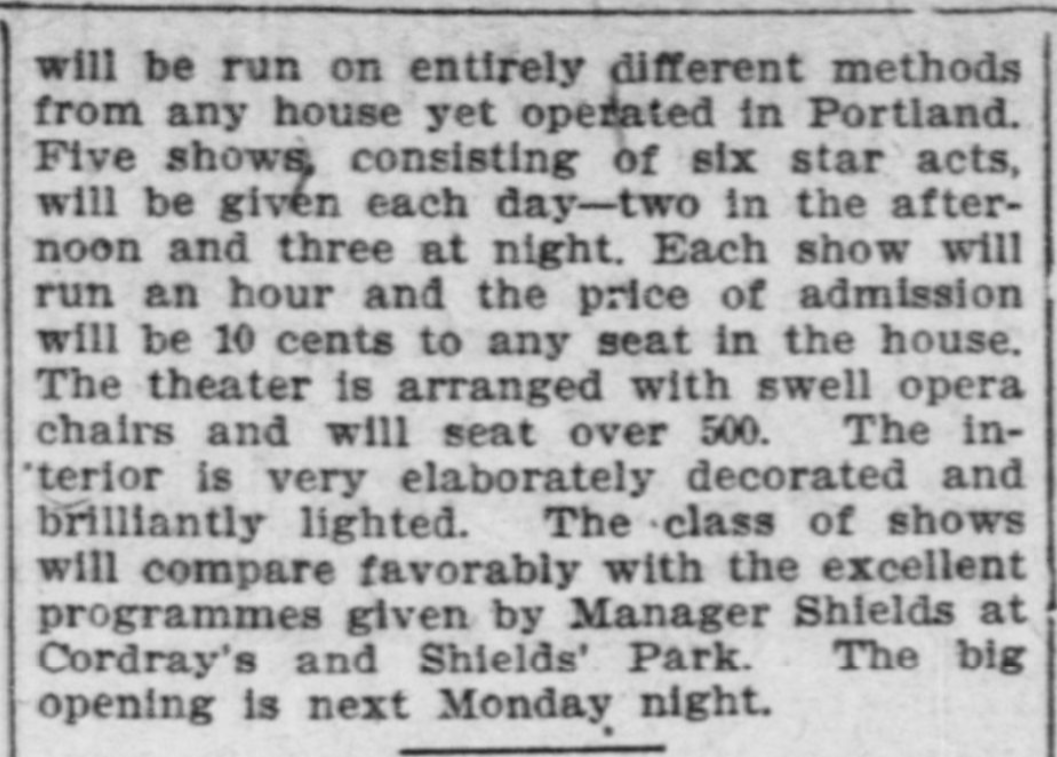
Variety also maintained the allure of being the first to present such format, as the appeal of "continuous" was that guests would be able to frequently attend at their decided time and still be frequently entertained. This can be seen in Cohn's first programming at the Arcade where a clipping from the Morning Oregonian in 1903 details shows from "necromancers and crayonists," "comedy artists," an "eccentric juggler," "monologists," "illustrated songs" and some shows from the polyscope to close. Though following a contemporary formula, it is also a successful painting of an image of just how much content managers and proprietors had to ensure their theater could provide to stay relevant. One thing that may not exactly translate easily to more modern times,is that many storefronts and locations were being converted to theaters around this time of the 1990's as this form of exhibition begins to take off in the country and in Portland specifically.
